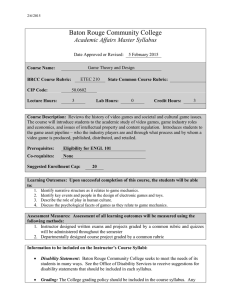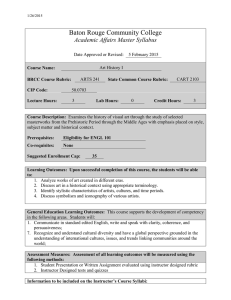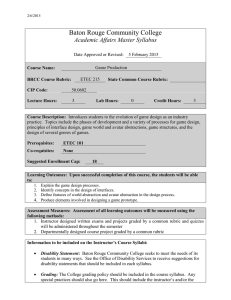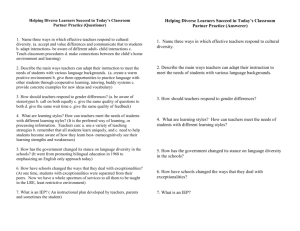Baton Rouge Community College Academic Affairs Master Syllabus
advertisement
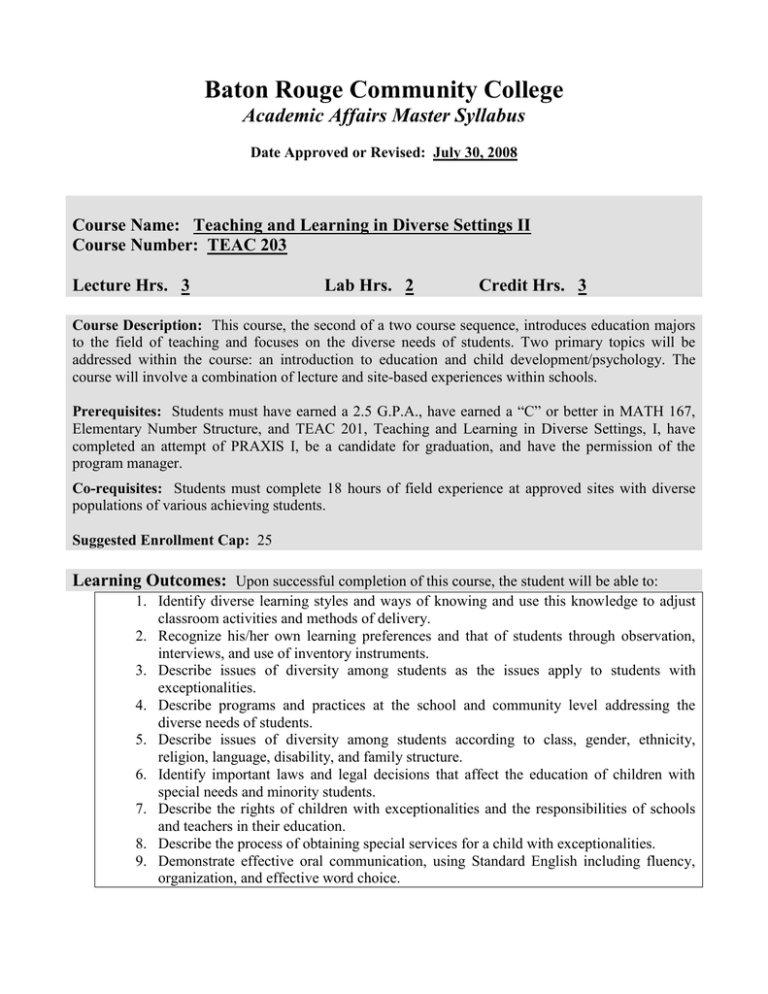
Baton Rouge Community College Academic Affairs Master Syllabus Date Approved or Revised: July 30, 2008 Course Name: Teaching and Learning in Diverse Settings II Course Number: TEAC 203 Lecture Hrs. 3 Lab Hrs. 2 Credit Hrs. 3 Course Description: This course, the second of a two course sequence, introduces education majors to the field of teaching and focuses on the diverse needs of students. Two primary topics will be addressed within the course: an introduction to education and child development/psychology. The course will involve a combination of lecture and site-based experiences within schools. Prerequisites: Students must have earned a 2.5 G.P.A., have earned a “C” or better in MATH 167, Elementary Number Structure, and TEAC 201, Teaching and Learning in Diverse Settings, I, have completed an attempt of PRAXIS I, be a candidate for graduation, and have the permission of the program manager. Co-requisites: Students must complete 18 hours of field experience at approved sites with diverse populations of various achieving students. Suggested Enrollment Cap: 25 Learning Outcomes: Upon successful completion of this course, the student will be able to: 1. Identify diverse learning styles and ways of knowing and use this knowledge to adjust classroom activities and methods of delivery. 2. Recognize his/her own learning preferences and that of students through observation, interviews, and use of inventory instruments. 3. Describe issues of diversity among students as the issues apply to students with exceptionalities. 4. Describe programs and practices at the school and community level addressing the diverse needs of students. 5. Describe issues of diversity among students according to class, gender, ethnicity, religion, language, disability, and family structure. 6. Identify important laws and legal decisions that affect the education of children with special needs and minority students. 7. Describe the rights of children with exceptionalities and the responsibilities of schools and teachers in their education. 8. Describe the process of obtaining special services for a child with exceptionalities. 9. Demonstrate effective oral communication, using Standard English including fluency, organization, and effective word choice. Assessment Measures: Assessment of all learning outcomes will be measured using the following methods: PASS-PORT Artifact: New version of a prepared lesson plan that reflects a different learning preference or emphasizes an intelligence or learning modality identified through student(s)’ inventory and an instructor-scored evaluation that examines the candidate’s adjusted lesson for consistent objectives, and methods of delivery in modalities that correlate with the students’ inventories. PASS-PORT Artifacts: Written reflection of a student’s response to his/her learning preferences and possible effects of those preferences on her teaching. A written review of a student’s inventory and observation of that student during a learning activity. Self-evaluation of the delivery of an adjusted lesson supporting a student’s strong learning modality or preferred intelligence. PASS-PORT Artifacts: Mid-term or final examination and completed observation form for a child with identified exceptionalities and instructor-scored rubric that addresses objectivity, accuracy, and similarities and differences for the individual child. PASS-PORT Artifacts: Mid-term or final examination and a candidate compiled list of available community resources, websites, and school programs scored by the instructor for the availability and quality of resources listed using a checklist. PASS-PORT Artifacts: Mid-term or final examination and written response to a case study evaluated by the instructor as to the candidate’s ability to interpret and apply important laws, rights, and responsibilities of children with exceptionalities, their parents, and the schools. PASS-PORT Artifact: Mid-term or final examination. PASS-PORT Artifact: Instructor review of a class presentation that addresses the accuracy and clarity of information presented. PASS-PORT Artifacts: Instructor review of a class presentation that addresses the accuracy and clarity of information presented. Written summary of the process of obtaining services for a child with exceptionalities to be reviewed by instructor for thoroughness and accuracy. PASS-PORT Artifacts: Self and peer evaluation of candidate’s delivery of a lesson to a small group of students that addresses fluency, word choice, and instructor scored in-class presentation evaluation rubric that addresses fluency , clarity, and word choice. Review of group interview with community college faculty and identified transfer university representatives. Field Experience: Students will complete 18 hours of field experience. Sites will be chosen in cooperation with local school systems in order to provide access to master teachers and well-run classrooms. Special attention will be paid to provide students with access to diverse populations of students. Candidates will work with small groups of diversely achieving students. Classroom teachers will ensure that groups are diversely achieving. Candidates will conduct prepared lessons on previously introduced materials with individual children and small groups under the direction of the classroom teacher. Candidates will also present a lesson of new material to a small group (Peer Evaluation Rubric, Self-Evaluation Rubric). Candidates conduct multiple intelligences or learning style inventory with a small group of students. Candidates implement a lesson plan and will make changes to the planned activity based on the results of the student’s inventory. Candidates will compare the effectiveness of the original and the changes by comparing student reaction and informal evaluation (Adjusted Lesson Plan Rubric, Adjusted Lesson Plan Reflection). Candidates will complete at least three of this course’s required hours of field experiences in a special education classroom or in a class that has at least two members with identified exceptionalities. Candidates will complete an observation of a student with identified exceptionalities as the student participates in a learning activity (Special Education Observation and instructor-scored Special Education Observation Rubric). Students will keep a reflective journal and write a summary of their experiences. Candidates will evaluate a peer and be evaluated by a peer at least twice during the semester. Information to be included on the Instructors’ Course Syllabi: Disability Statement: Baton Rouge Community College seeks to meet the needs of its students in many ways. See the Office of Disability Services to receive suggestions for disability statements that should be included in each syllabus. Grading: The College grading policy should be included in the course syllabus. Any special practices should also go here. This should include the instructor’s and/or the department’s policy for make-up work. For example in a speech course, “Speeches not given on due date will receive no grade higher than a sixty” or “Make-up work will not be accepted after the last day of class.” Attendance Policy: Include the overall attendance policy of the college. Instructors may want to add additional information in individual syllabi to meet the needs of their courses. General Policies: Instructors’ policy on the use of things such as beepers and cell phones and/or hand held programmable calculators should be covered in this section. Cheating and Plagiarism: This must be included in all syllabi and should include the penalties for incidents in a given class. Students should have a clear idea of what constitutes cheating in a given course. Safety Concerns: In some programs this may be a major issue. For example, “No student will be allowed in the safety lab without safety glasses.” General statements such as, “Items that may be harmful to one’s self or others should not be brought to class.” Library/ Learning Resources: Since the development of the total person is part of our mission, assignments in the library and/or the Learning Resources Center should be included to assist students in enhancing skills and in using resources. Students should be encouraged to use the library for reading enjoyment as part of lifelong learning. Expanded Course Outline: I. Education in an age of change A. Becoming a professional educator B. Challenges of school reform II. Effective instruction in the diverse classroom A. The curriculum B. Learning styles and preferences C. Multiple intelligences D. Management and discipline E. Assessment III. Diversity A. Programs and practices B. Class, gender, ethnicity, religion, language, disability, and family structure C. Laws and court decisions D. Social and philosophical perspectives E. Use of technology with special learners IV. Exceptionalities A. Programs and practices B. Rights and responsibilities C. Legal issues affecting learners and teachers V. PRAXIS
